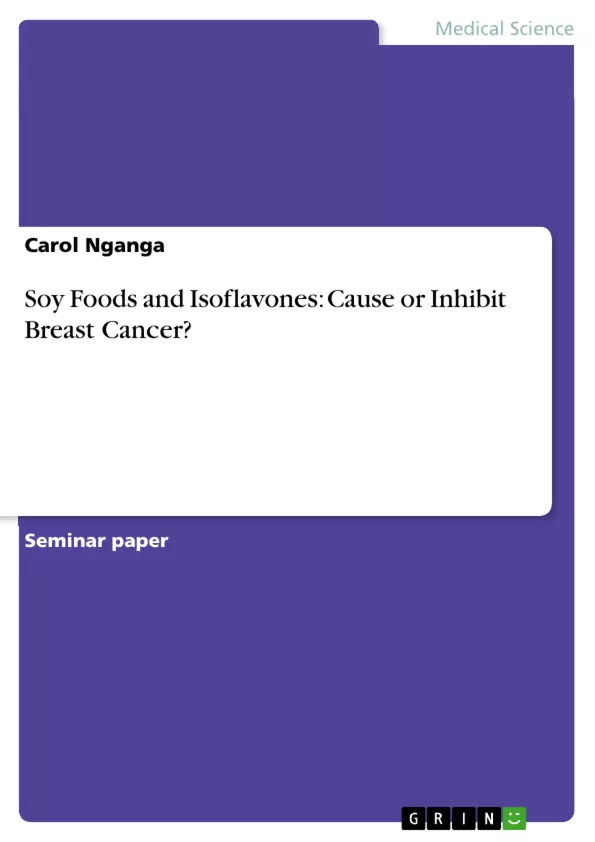The impact of soy foods on potential breast cancer risk has been a topic of considerable investigation in the medical field. The primary importance of research on soy foods is derived from the fact that these foods are rich in isoflavones, which are supposedly associated with inhibition of breast cancer development (Messina & Wood, 2008, p.1). Isoflavones are mainly contained in soybeans. High soy food intake in Asian countries like Japan is said to have sparked research on the role of isoflavones on reduction of breast cancer in 1990s (Messina & Wu, 2009, p.1673). Some isoflavones such as genistein possess non-hormonal properties that are associated with breast cancer inhibition in women. Thus, it is highly prudent to say that there are several mechanisms by which soy may reduce the risk of breast cancer in women. However, recent epidemiological studies have provided evidence suggesting that isoflavones indeed promote breast cancer (Kang et al, 2010, p.1859). This is because isoflavones such as geinstein have been found to stimulate growth of breast cancer cells which are estrogen-sensitive in overectomized mice. Several in vitro studies have shown that isoflavones can both inhibit or enhance ability of drugs to fight breast cancer (Nagata, 2010, p.83). Thus, understanding of the effects of isoflavones on breast cancer is still vague. This paper explores whether consumption of soy foods and isoflavones cause or inhibit breast cancer in women. In section 1, definitions of Isoflavones, biological functions and endocrine therapies will be given. In section 2, supporting literature on the positive and negative effects of isoflavones will be discussed. In section 3, several studies will be used as examples to support the information provided in section 2.
Table of Contents
- Introduction
- Hypothesis
- Research question
- Justification
- Section 1: Definition of isoflavones, biological effects and relative risk
- Section 2: Supporting literature on effects of Soy food on breast cancer
- Genistein
- Daidzein
- Section 3: Analysis and findings based on various studies
Objectives and Key Themes
This paper investigates the potential impact of soy food consumption, particularly isoflavones, on breast cancer risk in women. It aims to evaluate existing literature and research findings to understand the complex relationship between isoflavones and breast cancer development.
- The biological effects of isoflavones, including their estrogenic properties and potential impact on cell growth and differentiation.
- The role of isoflavones in modulating breast cancer risk, both in terms of potential protective and promoting effects.
- The influence of soy food intake on breast cancer incidence rates, particularly in relation to population studies and the significance of dietary habits.
- The limitations and controversies surrounding the use of isoflavones as a potential breast cancer treatment or preventative measure.
- The need for further research to elucidate the complex mechanisms involved in the interaction between isoflavones and breast cancer development.
Chapter Summaries
The introduction highlights the growing interest in the link between soy food consumption and breast cancer risk, specifically focusing on the role of isoflavones.
Section 1 delves into the definition of isoflavones, their biological functions, and the concept of relative risk in disease contexts.
Section 2 explores the supporting literature on the potential effects of soy food consumption on breast cancer. This includes discussions on the anticancer properties of genistein, the role of daidzein in enhancing tamoxifen efficacy, and the importance of early-life soy intake.
Section 3 analyzes findings from various epidemiological studies, focusing on a Singaporean prospective study that examined the relationship between soy food intake and breast cancer risk in postmenopausal women.
Keywords
Isoflavones, soy foods, breast cancer, genistein, daidzein, phytoestrogens, estrogen receptors, cell proliferation, apoptosis, angiogenesis, tamoxifen, epidemiological studies, relative risk, breast cancer incidence, dietary habits.
Frequently Asked Questions
Do soy foods and isoflavones prevent or cause breast cancer?
The relationship is complex. While some studies suggest isoflavones like genistein inhibit cancer development, others indicate they might promote growth in estrogen-sensitive cells.
What are isoflavones and where are they found?
Isoflavones are phytoestrogens primarily found in soybeans. They possess both hormonal and non-hormonal properties that affect cell growth.
What is the role of genistein in breast cancer research?
Genistein is an isoflavone associated with breast cancer inhibition, but some epidemiological studies suggest it may also stimulate estrogen-sensitive cancer cells in certain conditions.
Why is soy intake in Asian countries a focus of research?
High soy consumption in countries like Japan is linked to lower breast cancer rates, sparking investigation into the protective role of isoflavones in these populations.
Can isoflavones affect the efficacy of breast cancer drugs?
Yes, in vitro studies have shown that isoflavones like daidzein can either inhibit or enhance the ability of drugs like tamoxifen to fight breast cancer.
Is early-life soy intake important for cancer prevention?
Supporting literature suggests that early-life soy consumption may be a significant factor in reducing the long-term risk of developing breast cancer.
- Quote paper
- Carol Nganga (Author), 2011, Soy Foods and Isoflavones: Cause or Inhibit Breast Cancer?, Munich, GRIN Verlag, https://www.grin.com/document/280533



